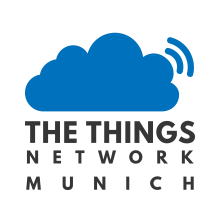LoRaWAN: Difference between revisions
(deleted Leechi, added Patreon) |
(added projects box) |
||
| Line 1: | Line 1: | ||
{{project | |||
|name = LoRaWAN | |||
|status = stable | |||
|image = ttn-munich-logo.png | |||
|description = a free LoRaWan Network for Munich | |||
|author = Severin, Heiko, Joe | |||
|username = | |||
|version = | |||
|update = | |||
|platform = | |||
|license = | |||
}} | |||
LoRaWAN is an RF standard for IoT devices to connect to the internet. | LoRaWAN is an RF standard for IoT devices to connect to the internet. | ||
== The Things Network Munich == | == The Things Network Munich == | ||
Latest revision as of 18:19, 26 December 2020
| LoRaWAN Release status: stable [box doku] | |
|---|---|

| |
| Description | a free LoRaWan Network for Munich |
| Author(s) | Severin, Heiko, Joe |
LoRaWAN is an RF standard for IoT devices to connect to the internet.
The Things Network Munich
We are a official The Things Network Community. There's a regular meetup in the third Week (one Evening) each month, 19:00, at the MuMaLab (online via Jitsi since Covid19).
- Community Page
- Group on Meetup
- Documentation: https://www.thethingsnetwork.org/docs/
We are gathering money for community operated gateways, infrastructure and our brand new Application Platform: Patreon Page
Gateway
See Gateway for more information
Client devices
See Nodes for more information
Projects
Smarter Together
- Vortrag Smart City München
- Überblick von der LHM: [1] [2]
- Bürgerempfehlung Intelligente Lichtmasten
- "Stadtteil der Zukunft"
Water Checks
Check the water quality of some lakes people go swimming in around Munich
- Temperature
- DS18B20
- Tubidity
TTN Mapping
ttnmapper.org allows to create a coverage map of the TTN LoRaWAN network. You can take a LoRaWAN node, either with integrated GPS, or pair it with a smartphone, and gather coverage data.
A node with GPS is nice, because it's more independent. An ideal candidate is the TTGO T-Beam dev board, which combines an ESP32, GPS module and a LoRa module, as well as a battery and potentially an OLED display as well.
- Basic firmware w/o OLED support
- Firmware by Hotti with OLED support
- Port of Hotti's FW to platform.io
Note that there are different versions of the T-Beam board, requiring different Pin settings.
Other Information
- https://medium.com/@ashujoshi/4-ingredients-needed-to-get-started-with-lorawan-1ff519274122
- TI Antenna selection Guide [3]
- Home made 868MHz Ground Plane [4]
- Introducation to LoRaWAN [5]
- Another Antenna [6]
Example Sensor projects
Alternative systems
- Talk about an also LoRa based alternative to LoRaWAN, which should be able to work coexistingly with LoRaWAN: LoraLight
